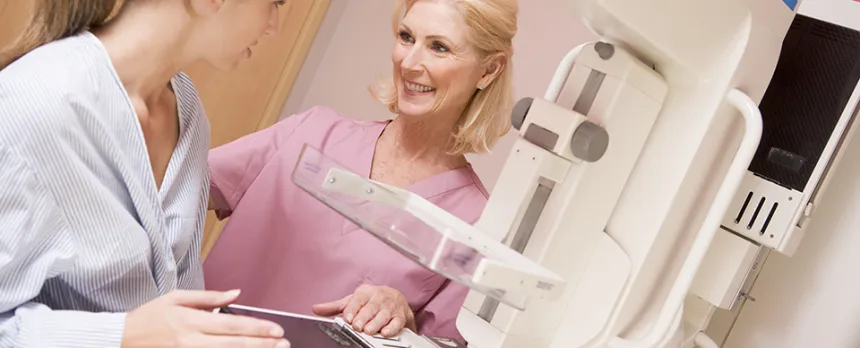Breaking Down Cancer and Genetics

Genetics plays a powerful role in shaping our health, and when it comes to breast and gynecological cancers, understanding genetic risk can be lifesaving. Cancer genetic counselors are at the forefront of this effort, helping individuals and families navigate the complex world of hereditary cancer risk.
What Is a Cancer Genetic Test?
Cancer genetic testing analyzes germline DNA — the genetic material we inherit from our parents and can pass on to our children. These tests examine specific cancer-related genes, looking for mutation, or permanent changes in the DNA sequence. When a mutation is detected in one of these genes, it may indicate an increased lifetime risk of developing certain types of cancer. For example, a mutation in the breast cancer type 1 (BRCA1) gene can significantly increase a person’s lifetime risk for breast and ovarian cancers.
Genetic Risk by Cancer Type
Most cancers happen by chance, but some breast and gynecological cancers run in families because of changes in genes that are passed down from generation to generation. Knowing whether cancer risk is hereditary (caused by a genetic mutation in the germline DNA), shared in families (familial, common in a family without a known genetic cause), or random (sporadic) helps doctors and patients choose the best ways to screen for and prevent cancer. If cancer does occur, knowing if it's a hereditary cancer can also help determine the most effective treatment plan.
Below is a summary of how genetics contribute to the risk of developing breast, ovarian and uterine cancers.
Breast Cancer
- 5-10% Hereditary
- 15-20% Familial
- 70-80% Sporadic
Ovarian Cancer
- 20-25% Hereditary
- ~10% Familial
- ~70% Sporadic
Uterine Cancer
- 3-5% Hereditary
- ~95% Sporadic
Why Is Genetic Testing Important?
Genetic testing plays an important role in cancer care by guiding both treatment and prevention strategies. Test results can inform the use of targeted therapies, recommend appropriate screenings and help determine surgical options.
Genetic testing also provides valuable insight into an individual's future cancer risks, supporting proactive and personalized health management.
Additionally, genetic testing can identify family members who may also be at increased risk, enabling relatives to determine the best strategies for cancer prevention and early detection.
Who Should Consider Genetic Testing?
Genetic testing is recommended for individuals with:
- A personal history of ovarian cancer, uterine cancer under age 50, breast cancer at or before age 50, triple-negative breast cancer, or male breast cancer
- A personal history of breast cancer at any age plus:
- One relative with ovarian or pancreatic cancer, or
- Two relatives with breast and/or prostate cancer (on the same side of the family)
Genetic testing is also recommended for those with:
- A family history of three or more breast/prostate cancers or colon/uterine cancers (on the same side of the family)
- A first- or second-degree relative with ovarian cancer
- Ashkenazi Jewish ancestry
The genetic testing process usually starts with a pretest genetic counseling appointment. Next, a sample — usually blood or saliva — is collected for analysis. Test results are returned within a few weeks and are reviewed with a genetic counselor.
What Do Cancer Genetic Counselors Do?
Cancer genetic counselors empower patients with knowledge and options, often influencing treatment decisions and preventive strategies. They also:
- Help patients understand how genetics impacts cancer risk
- Support informed decision-making about genetic testing
- Explain genetic testing results and guide next steps in care
As our understanding of genetics continues to evolve, so does our ability to detect, prevent, and treat breast and gynecological cancers more effectively. Genetic testing offers insights that guide treatment decisions and help assess the risk of developing cancer. Speak with your primary care doctor to see if testing is right for you.
Note: The content of this blog is for informational purposes only. It is not intended for use as diagnosis or treatment of a health problem or as a substitute for the professional consultation of a physician or qualified health care provider. If you have specific questions or concerns regarding a health or medical condition, contact your physician or a licensed health care professional.




